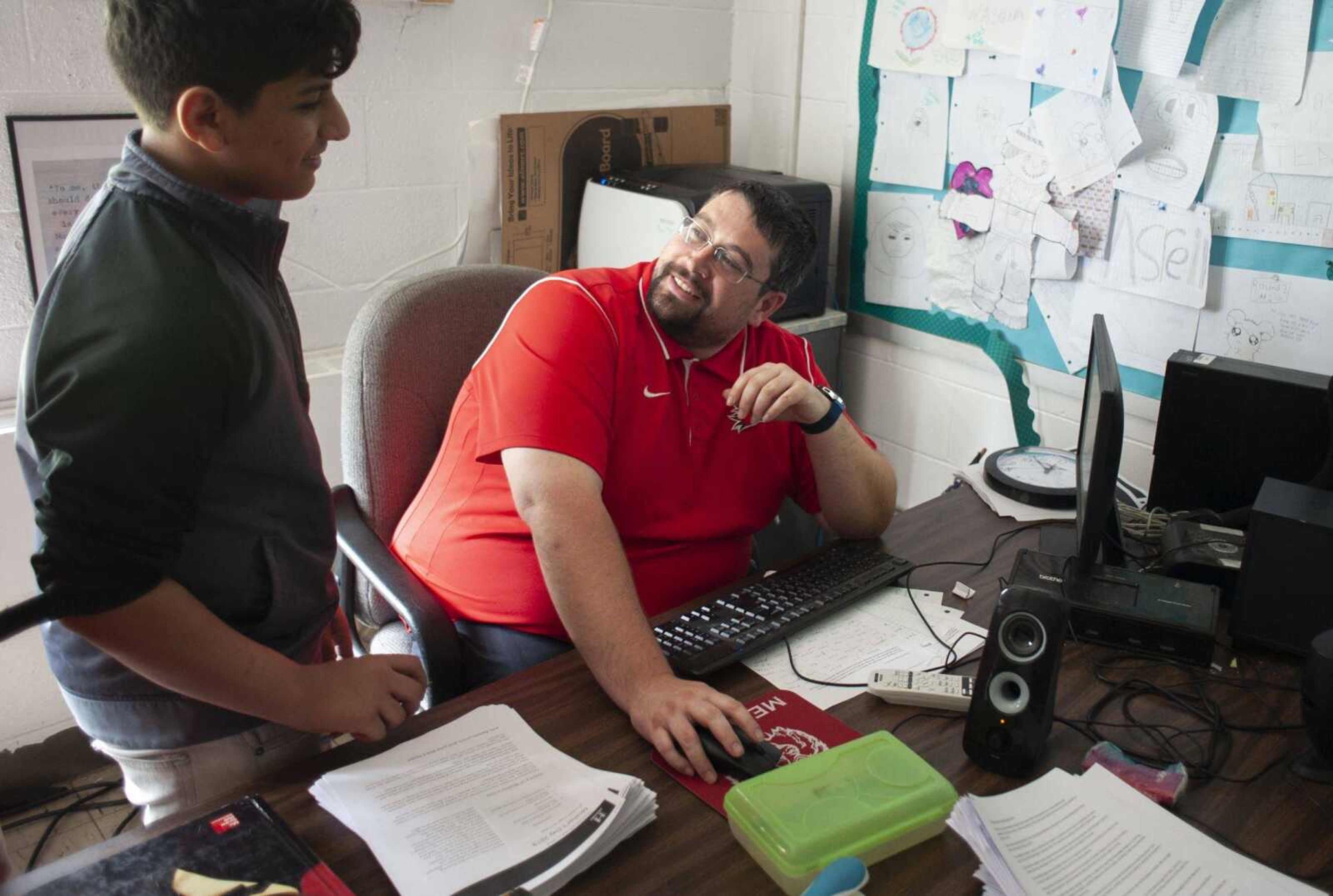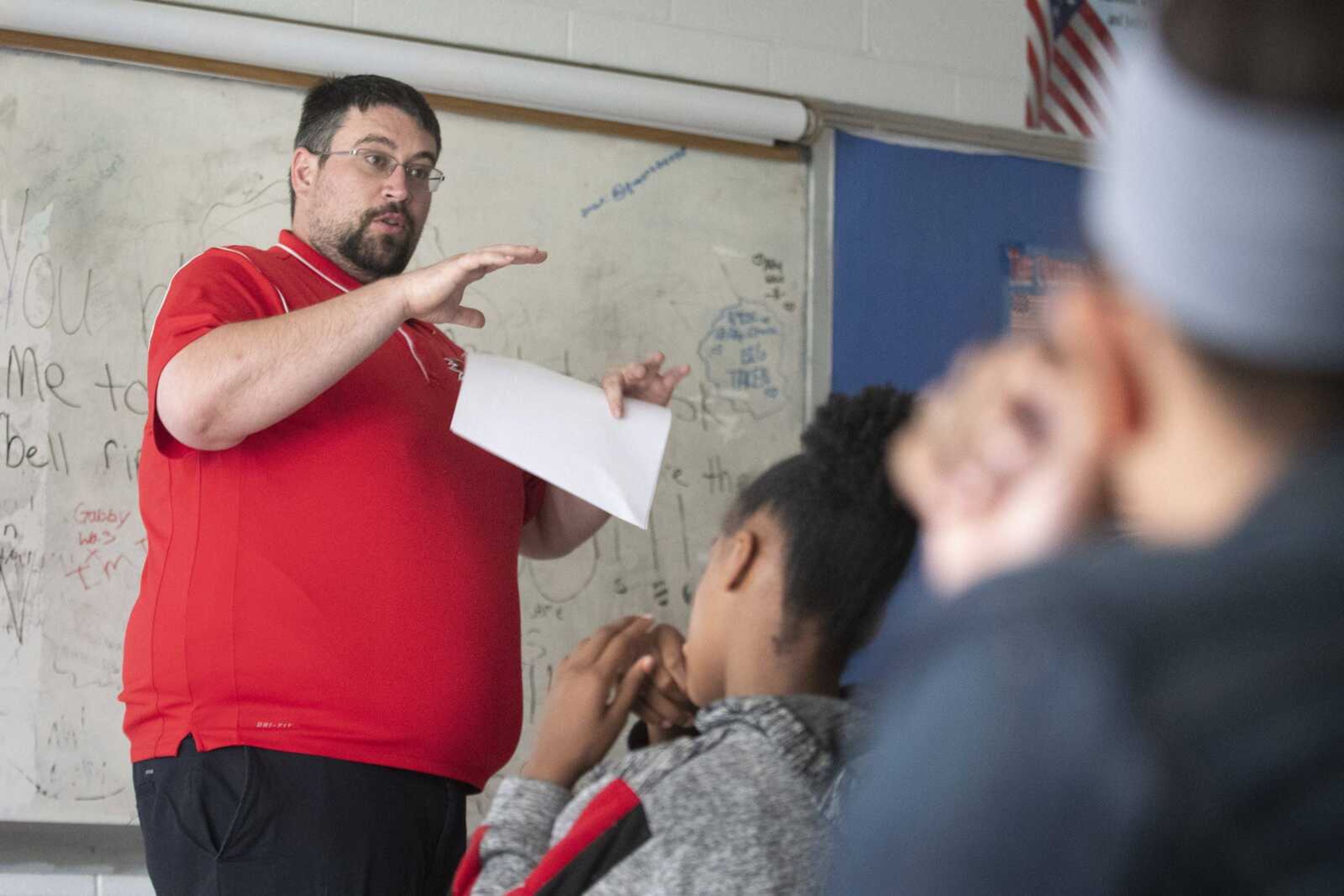In Illinois, a teacher shortage 'crisis' emerges with no quick solutions in sight
Public school districts in Illinois are in the midst of a teacher shortage. Nowhere is the problem more serious than in some of the state’s southernmost districts where several school administrators say a dwindling pool of job applicants, along with other factors, will force them to hire more substitutes and noncertified teachers when the 2019-2020 school year starts in August...
Public school districts in Illinois are in the midst of a teacher shortage.
Nowhere is the problem more serious than in some of the state’s southernmost districts where several school administrators say a dwindling pool of job applicants, along with other factors, will force them to hire more substitutes and noncertified teachers when the 2019-2020 school year starts in August.
“I’m not one to cry wolf, but I would use the word ‘crisis,’” said Joshua Stafford, school superintendent in Vienna, Illinois. “And it won’t be resolved overnight. As desperately as I’d like that to be the case, it won’t be.”
Stafford said the situation “is a systemic, comprehensive problem and will affect people from Cairo to Chicago before it’s over with.”
Vienna is about 40 miles east of Cape Girardeau in Johnson County. The school district there includes four grade schools and a high school and has an enrollment of approximately 1,300.

“This year, we were able to eke by and were fortunate to staff all of our teaching positions except for one in a third-grade classroom that we filled with a long-term substitute,” Stafford said, “but going into the 2019-20 school year, I’m scared to death.”
In the coming year, he knows he’ll need to hire two high school math teachers to fill vacant positions, including one who can teach at the college level to handle dual-credit courses.
“We’ve had that position posted for more than two weeks and have had zero applicants,” he said. “Four years ago, within two weeks I would have had 40 applicants if not more. To go from 40 to zero is scary. It concerns me greatly.”
Stafford said he’s losing another veteran teacher because the district simply can’t afford to keep him.
“We’ve had a science teacher for 12 years who for the past three years has been thinking about leaving to be an insurance adjuster and make more money to support his family, so he, too, will be leaving,” Stafford said. “I hate to lose him, but I can’t compete.”
Raising minimum pay
The Illinois legislature has taken steps to increase the starting pay for beginning teachers to a minimum of $40,000 over the next few years, a move Stafford has mixed feelings about.
“That’s a conundrum,” he said. “I unapologetically take the position that we don’t need a state bureaucrats making decisions for local school boards, but on the other side of the coin, it’s ridiculous that there’s a teacher anywhere in America making less than $40,000 a year.”
But increasing the salary for new teachers will, in turn, create another challenge for school districts, many of which are rural with tax bases that don’t generate enough revenue to support higher wages. In addition, when starting pay for new teachers is increased, salaries for educators with more years of experience will also have to be adjusted upward.
Steve Webb, superintendent of the Goreville Community Unit District 1 a few miles north of Vienna, agreed. He said a higher base salary for starting teachers will be a hardship on rural district like his unless the state’s teacher funding formula is modified.
“What are small rural areas doing to do?” he asked. “It’s a major issue and we seem to be just trying to put a Band-Aid on it.”
“We have an issue in the State of Illinois of how we fund schools,” Stafford said and noted a new “evidence based” funding model is a “step in the right direction,” but it will be years before it is fully in effect.
“It’s going to shift the funding burden, over time, to the state, and that is, constitutionally, where the burden belongs,” Stafford said. “But we’re only in our second year of implementation; it’s going to take 10 years for that transition to happen.”
According to the Missouri Department of Elementary and Secondary Education, Missouri’s minimum salary for public school teachers is $25,000 a year while the minimum salary for a full-time teacher in Missouri with a master’s degree and at least 10 years of public teaching experience is $33,000. In Cape Girardeau, the 2018-2019 starting base salary for beginning teachers is $34,750 plus benefits.
Pensions, standards
Webb has served as superintendent of the 600-student Goreville district 17 years and said he sees far fewer candidates for teaching positions now than he did a few years ago.
“I just interviewed candidates for a special-education position and a high school science position,” he said. “As recently as 10 or 12 years ago, we would have had 30 to 40 applications. This time we had five for each position.”
Webb is a past president of both the Illinois Association of School Administrators and the Association of Illinois Rural and Small Schools. He is a board member of the American Association of School Administrators. He said one reason for the current situation can be traced back to problems in the Illinois pension system.
“The State of Illinois chose not to pay into state pensions and decided to kick the can down the road and let someone else worry about it,” he said. “So in its infinite wisdom, instead of fixing things, the state decided to take it out on teachers and other state workers who protect us and teach our kids.”
Another problem, he said, is the state raised the testing requirements for university students interested in a teaching career.
“Legislators like to say how much they’ve increased the rigor to become a teacher, but what they’ve done is discourage people from entering the field,” Webb said.
Drop in teacher grads
According to a study conducted last fall by the Illinois State Board of Education (ISBE), there were more than 1,400 vacant teaching positions in Illinois during the 2017-2018 school year. The study also reported that between 2008 and 2016 there was a 23% drop in the number of people completing teacher preparation programs nationwide and in Illinois the decline has been even steeper. According to the ISBE, the number of candidates enrolling in and completing teacher preparation programs decreased by 53% between 2010 and 2016.
While the staff shortage has affected most of the state’s 852 school districts, data in the report indicated the problem is more acute in certain regions such as the rural districts of Southern Illinois. It also noted although there has been a 2.2% reduction in overall student enrollment in Illinois over the past 10 years, the decline in the number of teachers, 3.4%, outpaced the decrease in student enrollment during the same period.
ISBE spokesman Max Weiss told the Southeast Missourian the board hopes to create a “competitive grant program” in FY2020 to help address the teacher shortage. ISBE also held an in-depth discussion on the teacher shortage at its April meeting. At that meeting, board members heard more than two hours of testimony confirming “the shortage will require short-term and long-term solutions,” he said.
The Teach Illinois report noted Illinois recently introduced several initiatives to help alleviate teacher shortages. For instance, the state has created a short-term substitute teaching license and now allows reciprocity for out-of-state educators who want to teach in Illinois.
The report also includes a set of seven policy recommendations that can be found at www.isbe.net/teachillinois.
But even if those recommendations are immediately implemented, relief won’t come soon enough according to Jonathan Green, superintendent of the Meridian School District in Mounds, Illinois.
“Twenty-one years ago when I applied for my first teaching jobs, there were a minimum of 25 applicants for every job out there and in some districts there were quite a few more,” he said. “Seven years ago, I was superintendent at Milstadt near Belleville, Illinois, which was a very good school district. We’d advertise an elementary job and we’d have as many as 125 candidates. Now you might have 10 or 11.”
He and other superintendents all noted teacher education programs in Illinois, as well as those in neighboring states, have been graduating fewer students who are entering the teaching profession.
“If you look across the state, all of the teacher education programs in Illinois are way down,” Green said. As a result, school districts often find themselves competing against each other to recruit from a limited workforce. “And when our neighboring school districts in places like Carbondale and Marion are able to pay more, it’s hard to compete,” he said. “It would be totally different if we had a good field of candidates.”
Long-term subs
Maryanne Boren, principal of Meridian Middle School and Meridian High School, said she currently has more substitute teachers in her classrooms than full-time staff.
“We’ve had positions advertised all this school year, but universities with education programs just aren’t graduating as many teachers,” she said. “Southern Illinois University in Carbondale only graduated two art teachers in December. We were lucky enough to snag one of them, and he started in January.”
The new art teacher filled one vacancy “but we still need a high school English teacher, high school math, high school social studies, junior high science, junior high social studies, a health teacher, a driver’s education teacher, two PE teachers and a library/media resources teacher,” Boren said. “That’s just in my building and not counting kindergarten through fifth grade.”
Boren said she and other school administrators have begun “thinking outside the box” to find solutions such as possibly introducing “flexible” school days that would allow students in one district to access teachers at other districts.
“For instance, if another school has an advanced math class that one of my gifted kids needs, we could possibly arrange to have our student attend that class either in person or remotely,” she said.
She has also hired “long-term” substitute teachers including one who started the school year mopping floors and emptying trash cans.
Alex Washam graduated from Meridian High School in 2006 then went on to earn undergraduate and graduate degrees in sports management at Southeast Missouri State University and Western Kentucky University, respectively. However, he was unable to find a sports management position and instead took a custodian job at his high school alma mater.
“I knew we needed teachers, and I wanted to give back to my school,” he said.
He sent a resume to the school superintendent and principal and now he is teaching junior high social studies as he pursues an online teaching degree from Grand Canyon University, which he expects to complete in the fall of 2020.
Washam’s mother also graduated from Meridian High School and taught in the Meridian district more than 30 years before retiring in 2009.
Boren said Washam’s “family connection” to the Meridian district helped bring him back and will hopefully keep him on the district’s faculty for years to come.
“We want people in our classrooms who value relationships with our students and Alex definitely does,” she said.
jwolz@semissourian.com
(573) 388-3630
Connect with the Southeast Missourian Newsroom:
For corrections to this story or other insights for the editor, click here. To submit a letter to the editor, click here. To learn about the Southeast Missourian’s AI Policy, click here.










